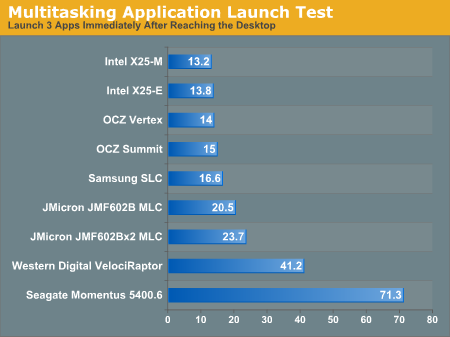The SSD Anthology: Understanding SSDs and New Drives from OCZ
by Anand Lal Shimpi on March 18, 2009 12:00 AM EST- Posted in
- Storage
The Fresh Boot Test
Allow me to set the stage. You just turn on your PC. I’m talking about a well used PC with tons of applications and data on the drive, not a clean test image. The moment you hit the Windows desktop you go and fire up the three applications you need to start working with right away.
If you ever wanted to know why SSDs are so much better, this is your reason. I ran through that exact scenario on our SSD testbeds. As soon as I hit the Vista desktop I ran Internet Explorer, Adobe Photoshop CS4 and Pinnacle Studio 12; I waited for all three to load, in the case of Pinnacle Studio I waited for my HD video project to load before stopping the timer.
The results speak for themselves:

Everyone’s beloved posterchild, the Western Digital VelociRaptor took 41.2 seconds to fully launch all three applications. Normal hard drives will fare much worse. The Seagate Momentus 5400.6, a high performance 5400RPM notebook drive took another 30 seconds on top of the WD time.
Now look at the SSDs; the worst SSDs we’ve got launch these applications in half the time of the VelociRaptor. The Intel X25-M will load the apps in about 13 seconds, barely a second longer than how long it takes to run Pinnacle Studio alone on an idle machine.
A good SSD makes Vista usable. All of the background tasks are nothing for these drives. If you ever sit there at an idle desktop and hear Vista go to town on your hard drive, those are IO operations that will bring any normal drive to its knees - or at least keep it busy enough to make all other IO requests take much longer than they should.
The SSDs that are worth recommending all deliver anywhere from 2x to 40x the number of IOs per second for small, random file writes compared to the Raptor. It doesn’t matter how many Raptors you RAID together, you’ll never achieve this sort of performance.










250 Comments
View All Comments
Erickffd - Friday, March 20, 2009 - link
Also created an account just to post this comment.Really impressive and well done article ! Will stay tune for further developments and reviews. Thank you so much :)
Also... very impressed by OCZ's respond and commitment upon end users needs and product quality assurance (unfortunately not so commun by large this days among other companies). Certanly will buy from them my next SSDs to reward and support their healty policy.
Be well ! ;)
Gasaraki88 - Friday, March 20, 2009 - link
This truly was a GREAT article. I enjoyed reading it and was very informative. Thank you so much. That's why Anandtech is the best site out there.davidlants - Friday, March 20, 2009 - link
This is one of the best tech articles I have ever read, I created an account just to post this comment. I've been a fan of Anandtech for years and articles like this (and the RV700 article from a while back) show the truly unique perspective and access that Anand has that simply no other tech site can match. GREAT WORK!!!Zak - Friday, March 20, 2009 - link
I just got the Apex. I'd probably cough up more dough for the Vertex after reading this. However, I've run it for two days as my system disk in MacPro and haven't noticed any issues, it's really fast. But I guess I'll get Vertex for my Windows 7 build.Z.
Nemokrad - Friday, March 20, 2009 - link
What I find intriguing about this article is that these smaller manufacturers do not do real world internal testing for these things. They should not need 3rd parties like you to figure this shit out for them. Maybe now OCZ will learn what they need to do for the future.JonasR - Friday, March 20, 2009 - link
Thanks for an excellent article. I have one question does anyone know which controller is beeing used in the new Patriot 256GB V.3 SSD?
tgwgordon - Friday, March 20, 2009 - link
Anyone know if the Vertex Anand used had 32M or 64M cache?Dennis Travis - Friday, March 20, 2009 - link
Excellent and informative article as always Anand. Thanks so much for posting the truth!!IsLNdbOi - Friday, March 20, 2009 - link
Can't remember what page it was, but you showed some charts on the performance of SSDs at their lowest possible performance levels.At their lowest possible performance levels are they still faster than the 300GB Raptor?
Edgemeal - Friday, March 20, 2009 - link
It's too bad Windows and applications don't let you select where all the data that needs to be updated and saved to is stored. If that was an option a SSD could be used to only load data (EXE files and support files) and a HDD could be used to store files that are updated frequently, like a web browser for example, their constantly caching files, from the sound of this article that would kill the performance of a SSD in no time.Great article, I'll stick to HDDs for now.